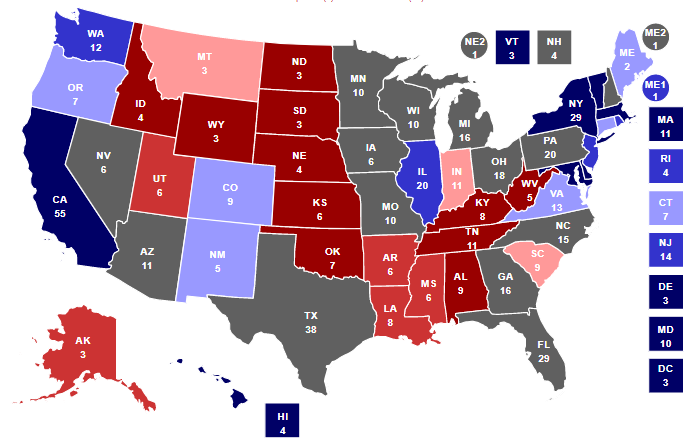More on the Absurdity of the Electoral College
A game wherein one team has to score more points to win than does the other.

I was looking at the latest 538 forecast and was looking over the “Weird and not-so-weird possibilities” section.
First this:
| Trump wins the popular vote regardless of whether he wins the Electoral College | 14 in 100 |
| Biden wins the popular vote regardless of whether he wins the Electoral College | 86 in 100 |
Now, this really should be the issue: what are the odds that a given candidate will win the popular vote.
Indeed, the real issue should be who can win 50%+1 support nationally:
| Trump wins more than 50% of the popular vote regardless of whether he wins the Electoral College | 10 in 100 |
| Biden wins more than 50% of the popular vote regardless of whether he wins the Electoral College | 80 in 100 |
But, of course, we have to look at the EC. Overall, the model shows Biden winning the presidency 74 out of 100 times, and Trump 25 out of 100, and a tie is 1 out of 100.
Here’s the breakdown for inversions (as well as for a tie):
| Trump wins the popular vote but loses the Electoral College | <1 in 100 |
| Biden wins the popular vote but loses the Electoral College | 11 in 100 |
| No one wins the Electoral CollegeNo candidate gets 270 electoral votes and Congress decides the election | <1 in 100 |
So, a tie is crazy unlikely–it is practically a unicorn, and yet a tie has the same odds at the moment as Trump winning the popular vote and losing the EC. Meanwhile, the chances of that happening to Biden is 11 out of 100.
That really underscores how much the system gives Trump an advantage.
Indeed, as per the above, Trump is only at 14/100 to win the popular vote. That means a chunk of his pathways to winning the presidency (a total of 25/100 as of this writing) are, again, popular vote/electoral vote inversions.
This reminded me of a column I read last night by Jesse Wegman in the NYT: The Electoral College Will Destroy America.
It’s hard to find anyone who disputes that Mr. Biden will win the most votes. This isn’t a liberal’s fantasy. In a recent panel discussion among four veteran Republican campaign managers, one acknowledged, “We’re going to lose the popular vote.” Another responded, “Oh, that’s a given.” The real question is will Mr. Biden win enough more votes than President Trump to overcome this year’s bias in the Electoral College.
This is just an absurd system that is truly difficult to defend.
The panel that the piece references contains the following passage:
ROE: We’re going to lose the popular vote.
DIAZ: Oh, that’s a given. That’s a given.
HANSEN: Yeah, for sure.
[…]
DIAZ: I believe if there’s record turnout, Trump can still win because of the power of the Electoral College. There’s still a pathway for him and it’s the pathway that I’ve been talking about forever. Hold the Sun Belt: North Carolina, Florida, Georgia and Arizona. Then, play in the Rust Belt and upper Midwest, [where he would only need to win one of these to reach 270]: Pennsylvania, Michigan, Wisconsin and Minnesota.
The four panelists are GOP were former campaign managers for Jeb Bush, John Kasich, Ted Cruz, and Marcp Rubio.
Back to Wegman:
The Electoral College as it functions today is the most glaring reminder of many that our democracy is not fair, not equal and not representative. No other advanced democracy in the world uses anything like it, and for good reason. The election, as Mr. Trump would say — though not for the right reasons — is rigged.
Indeed.






The electoral college was a sop to the slave holding states, to give them outsized power. It has directly thwarted the will of the people in 2 elections. As a result, we got enmeshed in the foreign policy catastrophe of invading Iraq (at least 4K dead soldiers, 20K wounded, and at least 150K dead Iraqis) and are now suffering through an incompetent covid response (200K dead Americans and counting!)
It’s long past time that the vote of someone in Wyoming should count more than mine. It’s long past time that candidates ignore California and New York in campaigns (because why bother? They’re solid blue states) so no one feels a need to address the annual California on Fire months.
We need to get rid of it. And take the senate with you.
Okay. And keep working on this point in the hopes that by the time that your grandchildren are my age (68), we’ll have election by popular vote. (I’m not being cynical or snarky here, I really do believe that a concerted push for this issue will put us about 3 generations away from amending the Constitution.)
A lot of this would go away if 2 things happened (neither of which require an Amendment, I believe).
1) Electors by district. End the “winner takes the state” system.
2) Apportion the districts so that they’re within a respectable margin (±5%?)
That eliminates the “Wyoming is worth more than me” and makes a lot more states “contested”.
Including districts that are severely gerrymandered, primarily, but not solely, by Republicans? No thanks…
I’m still waiting to hear a legitimate argument as to why the presidency shouldn’t be decided by a straight popular vote…
Given the propensity for silver bullets and simple solutions, I expect things like the National Popular Vote Interstate Compact to gain much traction, attention, and especially money. Even if it ever reaches the 270 EC votes, as represented by member states, to pass, it would face numerous legal challenges, starting with acquiring consent from Congress.
Next up would be a “simple” solution: reform. Of course, reform is never simple, but it’s easier than abolishing the EC. So look for things like apportioning EC votes on the basis of population, plus two votes representing two senators from every state (compromise, you know).
Or maybe even a step back, increasing the size of the House to give the bigger states their fair share of representation in the House and the EC (ie every district in the country having roughly the same number of people).
Then look for that to get complicated with more states dividing their EVs by district, either corresponding to Congressional districts or not.
the actual “simple” solution, which is not simple, is to abolish the EC outright, and go to direct election by popular vote, requiring a literal majority (ie 50.000000000000001% of the vote), and either provide for a runoff, or ranked choice voting.
@Just nutha ignint cracker:
I think 3 generations is optimistic, but we can hope. In the meantime, I remember a colleague back from Viet Nam who suggested that, since the rich loved themselves a draft, that all registered voters names be dropped in a hopper, and if that name was pulled, they were the serving dogcatcher/mayor/congress-critter/president for that term. Now that would be chaotic and (for me at least) vastly entertaining…
@An Interested Party:
I’m sorry. I was taking a change to “fair districting” as a given. I probably should have explicitly added it to the list.
@Mu Yixiao:
The problem is that there is really not such thing as fully fair districting and by subdividing the voters of a state into districts you create distortions whether you want to or not.
As such, doing the EV by district really isn’t a very good idea.
There would be better odds with getting a constitutional amendment than there would be to achieve fair districting…
The EC isn’t going anywhere. You won’t get enough states to amend the Constitution. And even if the Interstate Compact gets enough traction, it will be challenged in the Courts. Increasing the size of the House is a good idea but it won’t actually change anything. I ran the numbers on this after the 2016 election and you could increase the House to 10,000 members and it wouldn’t have changed the outcome. It doesn’t matter if the game is rigged if it’s the only game in town.
(The Senate isn’t going anywhere either. That would require unanimous consent of the states, which won’t happen.)
@Steven L. Taylor:
There’s nothing that’s completely fair. But there’s “more fair than we have and actually acheivable”. I’ve seen models for data-driven districting that do a rather good job of equalizing things while keeping the boundaries natural. That’s a solved problem–it’s just a matter of which of the several solutions to adopt.
As opposed to the winner-take all system we have?
@flat earth luddite:
I think two generations (50 years, roughly) to get a major amendment through is realistic. But I suspect that it won’t be an EC change, it will be an explicit exit clause. The exit terms won’t be particularly onerous because if you’ve got 38 states that want an exit clause, you’ve probably got 38 that intend to exercise it in some fashion.
BTW, much has been said about the framers of the Constitution not having considered political parties. So, to be fair, they may have envisioned a slate of candidates rather than a mere two (and recall there were some odd elections, like that of 1860, with four candidates garnering EVs; or the 1912 election, when the GOP came in third place).
So, as to the traditionalist/originalist argument, has the EC ever worked as intended?
@Hal_10000:
The electoral college is an intolerable, undemocratic joke. Admit DC as 50 different states and force the reform. Done.
@Kathy:
It never worked as intended.
And yes, they expected a bunch of regional candidates with none likely to win the majority of th EC and, therefore, expected the House to have to choose the president fairly regularly.
@flat earth luddite: Your pessimism is why I say a “concerted push.” Right now, we get a lot of handwringing about the EC about 18 out from the election, then forget what we were concerned about for about 25 or 30 after the election is over. Short attention span is the enemy of almost everything positive.
I like your other proposal, though. Harry Reasoner (I think) called the idea “randomocracy.” As long as I have an unlisted telephone number, the nation is safe, too. 😉
@Michael Cain: The Constitutional change resulting in the dissolution of the United States (I’m assuming that’s what an exit clause would result in, after all) is an interesting idea. Don’t see it happening as it would be even more complex than Brexit because of Social Security, if nothing else. (Remembering that SS is neither a pension trust, nor an insured annuity.)
@Mu Yixiao:
Allocating EC votes by district will only make the EC less democratic. The way to improve the EC is to allocate the votes proportionally based on the percentage of the vote obtained by the top 2 vote getters.
@Sleeping Dog:
Caveat: It’s old-people night at the wine bar, and I’m about to go to bed.
How does being more representative of the differences in states become less democratic?
Districts by Party 2016
If you’re a Republican in California or a Democrat in North Dakota you have zero voice in the presidential election. That’s true for the vast majority of states.
Illinois has a population of 12.6M. 9.5M are in the Greater Chicago Area. One city dictates how the entire state operates. Chicago is the only voice that is heard–in the state legislature, in Congress, and in the Electoral College.
I continually see people saying “Democracy isn’t mob rule; Democracy protects the voice of the minority”.
The minority in every state (except Maine & Nebraska) has zero voice in presidential elections. How is that more democratic than giving every district their own distinct voice? If California had 22 red districts and 21 blue districts, why does that result in 55 electoral votes for red? Half the population had their votes silenced.
There are states (blue and red) where it’s completely pointless to vote if you’re of the minority party–even though your district is 90% “your color”.
The biggest issue with “winner takes all” isn’t the presidency. It’s the downstream fallout. People go to the polls to vote for the president. A few go to the polls to vote for senators or representatives. It’s the rare individual who goes to the polls only to vote for state, county, and municipal positions. But state, county, and municipal governments have far more direct affect on individuals than the president does.
Everyone who doesn’t vote because “Presidential Candidate X is going to win this state, so my vote is pointless” loses out on the opportunity to affect their local government. If every district mattered at a federal level, it would get more people out to vote–which would make state, county, and municipal governments more representative–and probably turn the election maps a lot more “purple”.
@Mu Yixiao:
You keep using the term “winner-take-all” as a contrast to the district allocation system you’re advocating. Both are winner-take-all. The district system is winner-take-all at the level of district. Trump won 47% of the vote in NE-02 but was awarded the entirety of its electoral representation while Hillary got nothing from it. That is the very essence of a “winner-take-all” contest.
And how is that more democratic than simply having an election based on the popular vote…
@David M:
Ah, yes. That plan for when the Platinum Coin Caper was too sensible for you.
@Facebones:
This simply isn’t true.
By far the most populous state was Virginia, a slave state Its delegates proposed the “Virginia Plan,” which would have had a unicameral legislature allocated by population.
The smallest states—all with a tiny fraction of Virginia’s population—were Delaware, Rhode Island, Georgia, and Vermont. They benefitted far and away more from the Electoral College. Of those, only Georgia was a slave state. The plan to allocate representation equally was proposed by New Jersey, also not a slave state.
The compromise that got us the Senate and the Electoral College was proposed by Connecticut. Again, not a slave state.
If you want to look to where the slave states got their advantage, look to the 3/5 Compromise.
@James Joyner:
“Of those, only Georgia was a slave state.”
Delaware was a slave state as well. Not that it changes your point that the Senate and Electoral College were designed to help small states, whether slave or free, which is correct.
Doesn’t have to be the top 2 vote-getters. Just figure out what proportion each EC vote needs and the person getting that percent gets a vote. For example, RI gets 4 EC votes, each person that gets at least 25% of votes gets an EC.
@BugManDan: The problem with any solution to EC vote distribution is that it is decided by the states so there is nothing in it for the party that “controls” the state.